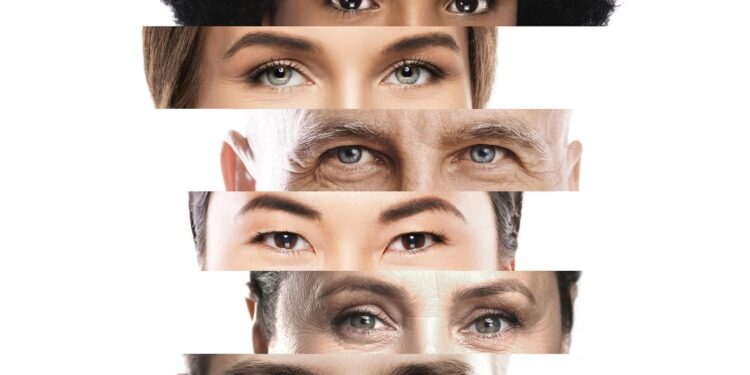Close-up male and female eyes of different ethnicity and age.
getty
America tells itself a story, one of grit and merit. Work hard, it says, and success will follow. That those who rise do so because they earned it, because they worked harder, because they wanted it more, because they proved themselves worthy.
It is a comforting story, one that explains inequality without ever challenging it. It reassures the winners and shames the rest. But in reality, merit in America has never been a simple equation of talent plus effort. Instead, it has been shaped by privilege, who gets the benefit of the doubt, who is welcomed in before they have even had to prove a thing, who is allowed to fail and try again, and who is denied a chance before they even begin.
A Black woman with a degree from the same school as her white colleague still makes less. A man with a name that sounds too foreign watches his résumé disappear before he even gets an interview. A brilliant and eager child steps into a school with outdated textbooks and overworked teachers, while across town, another child—no brighter, no more hardworking—walks into a classroom with college counselors, AP courses, and every resource at their fingertips.
That is the reality of American merit; it rewards proximity to power.
The Backlash Against Diversity, Equity and Inclusion (DEI): Fear, Not Fairness
When those locked out for generations finally find a way in, the powerful do not ask whether the game was fair to begin with. Instead, they look for someone to blame.
And now, they have found their target in DEI.
DEI does not threaten merit. It threatens the lie that merit ever existed in the first place.
The same people attacking DEI today had no problem with a system that privileged familiarity over competence, legacy over talent, comfort over competition. Simply, they had no problem with a rigged game as long as it was rigged in their favor. But the moment DEI pushes for a different vision, they cry foul.
They fear that those who have always been qualified will finally be seen. And that is what makes DEI dangerous to its critics. It forces them to clear the bar.
The Business Case for DEI: Who Gets It
Companies like Costco and JPMorgan Chase understand that diversity is not a liability—it is a competitive advantage. Studies show that diverse teams perform better, solve problems faster, and drive innovation.
In a marketplace that changes by the second, the businesses that thrive will be the ones that embrace different perspectives, pull from a full range of talent, and are not stuck in the past. Meanwhile, companies abandoning DEI are defending an outdated hierarchy where success is built not on skill, but on sameness. And they will pay the price.
Who Has Really Benefitted from Identity-Based Advantage?
The critics of DEI say it prioritizes identity over ability. That it disrupts the so-called natural order. That it hands out opportunities to the undeserving.
But whose identity has been prioritized for generations? Who has been handed opportunities long before they ever had to earn them?
The truth is, America has always chosen identity over ability.
DEI does not distort merit—it reveals it. The real threat to the old order is fairness. Fairness forces us to acknowledge that much of what passes for merit has always been about access, not ability.
The True Stakes of the DEI Fight
DEI was never just about hiring policies or corporate diversity initiatives. The fight against it is part of something as old as America itself—the battle over who gets to belong, who is allowed to rise, who is granted access without having to prove themselves just to be seen as worthy.
The answer to that question was determined in the cotton fields and the coal mines, in the segregated schools and redlined neighborhoods, in the boardrooms where power was passed from one familiar hand to another, where the rules were set to ensure that some would always win while others never even got to play.
Dr. Martin Luther King Jr. knew this struggle well when he said, “Nothing in all the world is more dangerous than sincere ignorance and conscientious stupidity.” He also reminded us, “In spite of my weakness, I heard this inner voice saying, ‘Stand up for righteousness, stand up for justice, stand up for truth.'”
The fight against DEI is not about logic. It is not about fairness. It is about protecting a system that was never meant to be questioned and preserving a power that was never meant to be shared.
The Choice Ahead
DEI critics claim to believe in opportunity and hard work. But the moment fairness demands sacrifice and change, the moment real equity threatens the comfort they have mistaken for superiority, they resist. They cling to the illusion that they earned everything alone—that DEI is the problem, not the generations of exclusion that made it necessary.
But we do not have to accept their fear. We do not have to accept their version of history. This country has never lived up to its promise—not because we have failed to work for it, but because we have failed to demand it.
The time for hesitation is gone. The stakes are clear. We move, or we surrender.
Let’s get to work.
Source link : http://www.bing.com/news/apiclick.aspx?ref=FexRss&aid=&tid=67ae063c271a4453aee46d64a84c54f7&url=https%3A%2F%2Fwww.forbes.com%2Fsites%2Flenwoodvlongsr%2F2025%2F02%2F13%2Fthe-myth-america-tells-itself%2F&c=4990879057214805659&mkt=en-us
Author :
Publish date : 2025-02-13 00:30:00
Copyright for syndicated content belongs to the linked Source.











